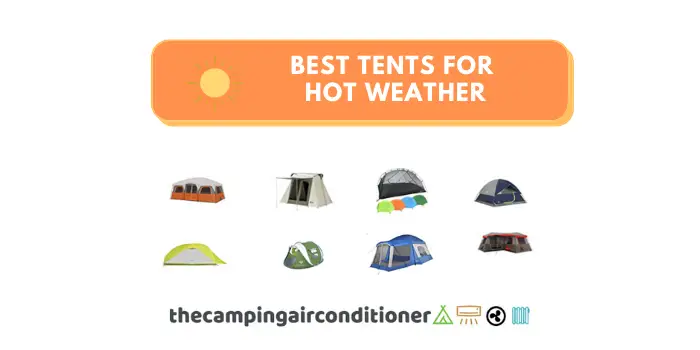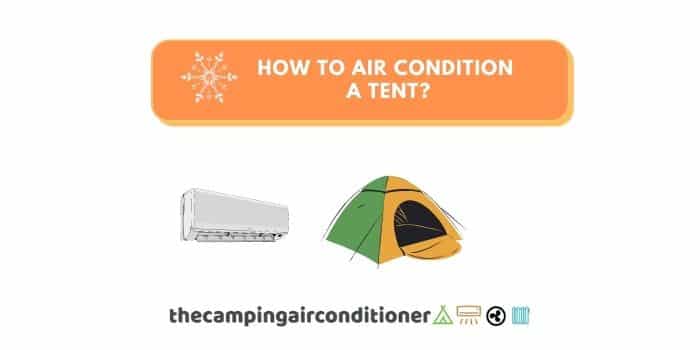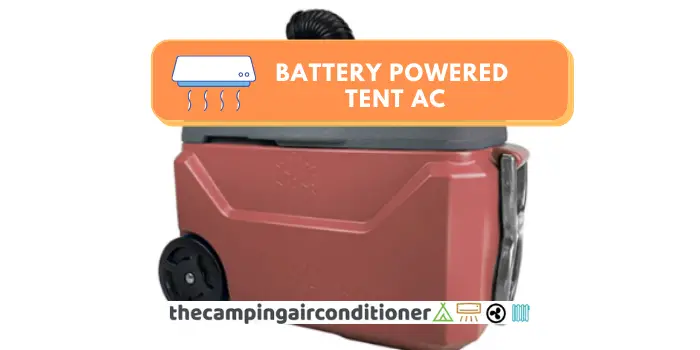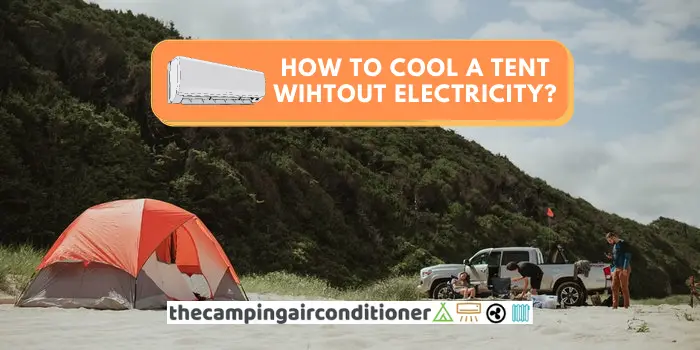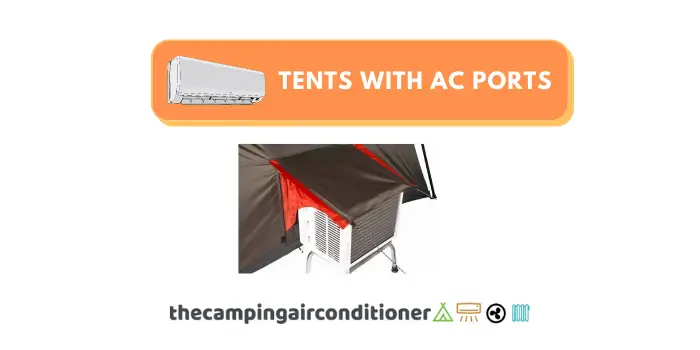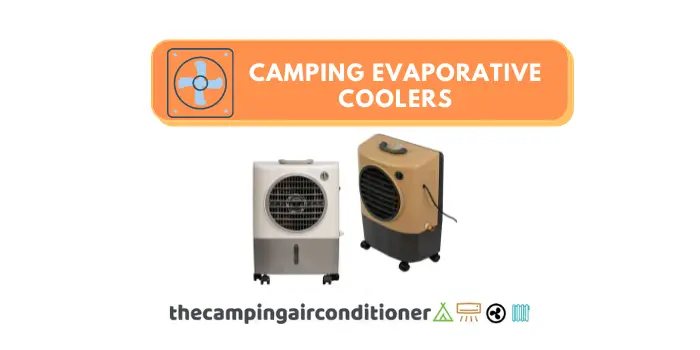If you are reading this post, it is probably because you have melted under a tent during a hot day. We get it, and that is why we created thecampingairconditioner.com – to help campers find the most comfortable way to sleep in a tent.
But why do tents get so hot? Overall, it is a consequence of trapping warm air inside it. And how does it happen? Because of numerous reasons, such as:
- Excessive sun exposure (Pitching your tent in the wrong spot and at the improper time)
- Lack of air circulation / ventilation
- Incorrect insulation
- Incorrect use of rainfly
- Tent’s size and material
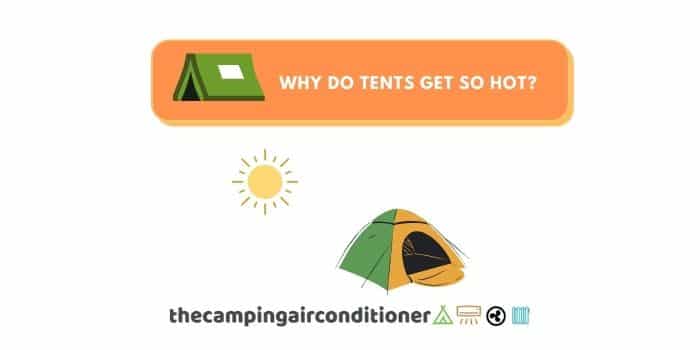
How to cool your tent down?
Tip 1 - How to avoid excessive sun exposure?
Before pitching your tent at your campsite, carefully assess what areas will better suit your camping need. Preferably, set it up close to hills, trees and rivers, which you provide you with a fresh breeze.
Leaving your tent exposed to the sunlight for the whole day will significantly increase the amount of warm air inside it and, consequently, its temperature.
Look for shady areas with plenty of green and ventilation. They both will help to prevent scorching conditions.
Tip 2 - How increase air circulation?
Choose open areas with abundant air circulation and constant airflow. During the day, leave your tent door and windows open to facilitate air circulation, and, if possible, pick tents with screen room.
Coleman WeatherMaster 6-Person Tent with Screen Room is an excellent option for medium-sized tents.
Further, if possible, choose canvas tents since they tend to have better breathability than nylon and polyester options.
Suggested Article
Tip 3 - How properly insulate my tent for summer days?
An insulation layer is supposed to create a physical barrier to avoid exchanging hot air and cool air.
Therefore, if you are insulating your tent with tarps or thermal blanks, ensure that you do it before the hot air gets inside. Otherwise, you will be creating an even hotter environment and trapping the scorching air within your shelter.
Preferably, insulate your tent at the end of the afternoon or very early in the morning, when the air inside your tent tends to be cooler.
Tip 4 - No rain, no rainfly
The use of rainfly might help to trap hot air inside your tent. Therefore, if there is no rain forecast, it is better to avoid using it.
Tip 5 - Pick the right tent size and fabric
The human being expels heat as part of its organism’s functions. A large group of campers inside a small tent might significantly increase its temperature and create an uncomfortable environment.
We always recommend having at least 25% spare capacity – for example, if you have 6 campers, bring gear for 8 people. The more space, the better it will be for air circulation.
The tent’s fabric will also directly influence the climate inside your tent.
Overall, canvas tents offer better insulation and breathability, ideal for summer camping (there is a catch, though – canvas tents are usually bulkier and heavier).
Also, give preference for tents with lighter colors given that they retain less heat.
Camping gear to help you cool down your tent
There are several devices to help mitigate scorching temperatures inside your tent, such as:
- Use a battery-powered tent air conditioner
- Use a portable air conditioner
- For large tents, you might consider a window AC unit
- Use an evaporative cooler
- Use a solar-powered tent fan.
- Create your DIY air conditioner
- If you are camping in an RV, you can use a mini split AC.
FAQ
Can I air condition my tent?
Yes, you can. There are several ways you can do it and we wrote a detailed article around it – check below.
Suggested Article
What size should my tent air conditioner be?
Overall, we recommend the following:
- Tents with adequate insulation will need at least 4 BTU per cubic feet.
- Tents without proper insulation will require at least 5 BTU per cubic feet (25% extra power required)
- If your tent is exposed to the sunlight and has no insulation, we recommend at least 6 BTU per cubic feet (50% extra power required)
Read this article for more information.
How to insulate my tent for an AC unit?
This article details 6 excellent tips for you (click here for more details):
- Buy a tent tarp
- Suppress any minor leakage with tapes and pool noodles
- Insulate your tent floor
- Use thermal blankets to cover your shelter
- Choose a suitable tent fabric
- Consider a tent with AC Ports
How to cool my tent without eletricity?
These steps will help you to mitigate warm temperatures inside your tent:
- Choose the adequate tent fabric
- Choose the best location to pitch your tent
- Set your tent up at the right time
- Use battery and solar-powered devices
- Use a reflective blanket
- Cool your body down
- Watch for tent ventilation
- Forget about your sleeping bag
- Build a DIY Air Conditioner
Conclusion
Planning will help you to mitigate excessive temperatures inside your tent. Overall, they will get extremely hot as a consequence of excessive sunlight exposure and lack of proper ventilation.
Ensure that you put in place simple measures, such as pitching your gear late in the afternoon and disassembling it during the day if possible. Look for shady areas with plenty of air circulation and close to water mains.
If it is still hot even with these measures, it is time to consider a tent air conditioner alternative.


